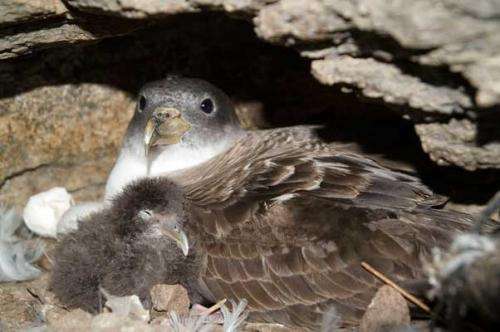Conservation and immunology of wild seabirds: Vaccinating two birds with one shot

A group of researchers from the University of Barcelona (Spain), the CNRS in Montpellier (France) and Princeton University (USA) report in The American Naturalist that the vaccination of females of a long-lived seabird species, the Cory's shearwater, results in levels of antibodies that allow their transmission to their offspring for several years and could provide several weeks of protection after hatching to these offspring.
Over a period of 6 years, in the Canary Archipelago (Spain), the researchers tracked the immune status of a large number of adults and chicks, a feat rendered possible by the breeding site fidelity of this species. The results show that the temporal persistence of maternally transferred antibodies in nestlings is highly dependent on the level at hatching. Furthermore, a second vaccination efficiently boosts the level of antibodies in females and thus their transfer to offspring.
This long persistence in adults and chicks has potentially strong implications for the use of vaccination as a conservation tool in natural populations of other long-lived species, such as albatrosses, threatened by specific emerging infectious disease agents. More generally, the results also highlight the need to consider the temporal dynamics of immune responses when studying the evolutionary ecology of host-parasite interactions. Because immunity may last and be transmitted for several years, the development of specific immunity early in life can have unforeseen consequences several years later when individuals from the next generation face exposure to the same disease agent.
More information: Raül Ramos, Romain Garnier, Jacob González-Solís, and Thierry Boulinier, "Long Antibody Persistence and Transgenerational Transfer of Immunity in a Long-Lived Vertebrate." The American Naturalist Vol. 184, No. 6 (December 2014), pp. 764-776. www.jstor.org/stable/10.1086/678400
Journal information: American Naturalist
Provided by University of Chicago

















